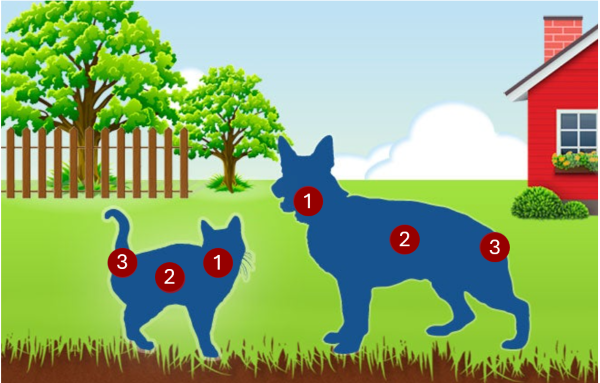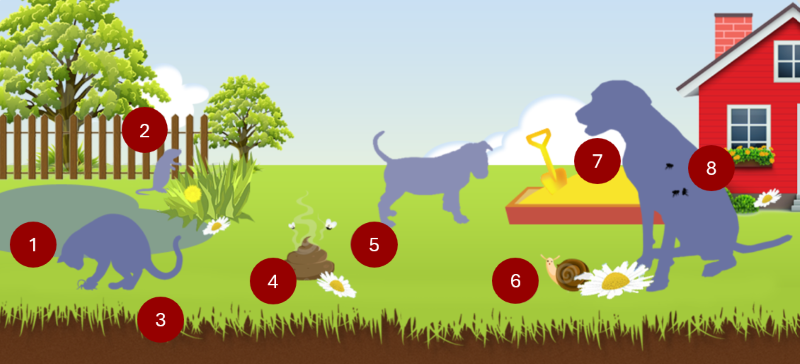What are worms in pets?
Worms are among the most common parasites of cats and dogs, and have the potential to cause health problems in our pets, and even disease in us. Unfortunately, more often than not our pets don't show any outward symptoms of having worms. That is not to say that the worms don’t do any harm. Different types of worms can cause different issues for both your pet’s health, and that of your family, so while this may not make for particularly pleasant reading, it is a subject worth understanding...
What are the different types of worms in dogs and cats?
There are several different types of worms that can affect UK pets:
 Roundworms
RoundwormsRoundworms are the most common intestinal parasite in dogs and cats, and the eggs are found in the faeces of infected dogs and cats.
 Tapeworms
TapewormsTapeworms are one of the most common parasites affecting both dogs and cats and is also spread by fleas.
 Lungworm
LungwormLungworm come in many different types, but one in particular that affects dogs can be fatal if left untreated. Dogs become infected by eating infected slugs and snails, or possibly even their slime.
 Whipworms
WhipwormsWhipworms can affect dogs in the UK, but rarely cats. It takes a large amount of eggs to cause an infection, so whipworms tend to only be found where large numbers of dogs cohabit, such as a kennels.
 Hookworms
HookwormsHookworms are found in dogs in the UK, but less commonly in cats. They can be picked up from walking on soil containing the larvae and latch on to the intestinal lining, to feed on blood.
 Heartworms
HeartwormsHeartworms are transmitted by mosquitoes, and are not common in the UK. However, they are a serious problem in other countries so if you are taking your pet abroad, speak to your vet about preventative products.
 Eyeworms
EyewormsEyeworms occur in dogs, cats and humans in southern Europe and are transmitted by flies picking up the infection from the tears of animals and humans.
Signs of worms in pets
Your pet is likely to be exposed to all kinds of worms on a daily basis and can easily pick them up without you knowing. Many pets don’t even display any obvious symptoms that might make you suspect. To help you play detective, here we list some of the common signs that indicate your pet may be infected. Of course, a lot of these could have different causes but it is worth talking to your vet if you have suspicions that worms may be to blame...

- loss of appetite; vomiting*; any general changes in behaviour; blood from mouth
- lack of energy; a dull, lifeless coat; a pot bellied appearance – particularly in puppies and kittens; breathing difficulties/heaving; coughing, laboured breathing
- 'scooting' - whereby the animal drags its bottom along the carpet; diarrhoea*; smelly stools*; blood in urine or faeces
*if you look closely you can sometimes see worms in faeces or vomit - but if you can't see anything, this doesn't mean your pet may not be infected.
Worm hotspots
It is very easy for pets to pick up worms, and given the rate at which some of the parasites multiply, they can be really difficult to avoid. See what could be lurking beneath a garden or park ...

- Scavenging: pets could become infected by eating dead animals - maybe a bird or rabbit killed on the road or a dead animal that they come across on a walk - or undercooked or raw meat that they might find in a bin.
- Hunting: rodents and rabbits carry worms and are a risk to hunting pets.
- Soil and sand: is often contaminated with parasitic eggs which can be easily swallowed by pets.
- Dog or cat faeces: some worms and eggs are transmitted in the faeces of infected animals.
- Other dogs: can be infected and pose a risk to your dog.
- Slugs/snails: can carry a parasite called lungworm which can be passed to your dog if they eat it.
- Sandpits: parks and playgrounds have been shown to have high levels of worm egg contamination.
- Fleas: can be infected with tapeworm which can pass to your pet if they are swallowed.
Frequently Asked Questions
Want to find out more about worms? Check out our frequently asked questions below.
